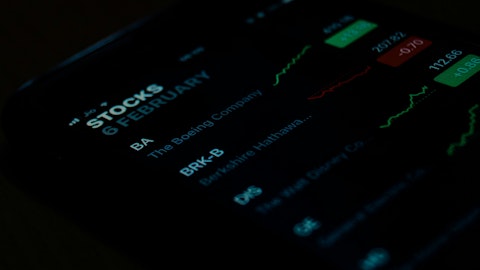We recently compiled a list of the 20 Worst Dividend Aristocrat Stocks According to Analysts. In this article, we are going to take a look at where T. Rowe Price Group, Inc. (NASDAQ:TROW) stands against the other dividend aristocrat stocks.
Dividend aristocrats are companies that have raised their dividend payouts for at least 25 consecutive years. Achieving and maintaining a dividend streak this long is a tough nut to crack. That is why, among the approximately 6,000 stocks listed on the NYSE and NASDAQ, only around 67 companies have earned the distinction of being called dividend aristocrats. This strong dividend growth track records imply that these companies were financially stable enough to sustain their payouts during two significant financial crises: the Great Financial Crisis of 2008 and the COVID-19 pandemic. Besides this, these companies have also shown strong performance relative to the broader market over the years. The Dividend Aristocrat Index has outperformed the wider market with lower volatility since its inception in 2005. Recently we covered the list of the 25 Best Dividend Aristocrats to Buy according to Wall Street analysts.
Analysts have closely observed the performance of dividend aristocrats in the past and in recent times. In a January 2019 blog post titled ‘Dividend Growth Strategies and Downside Protection’, Phillip Brzenk, global head of multi-asset indexes, analyzed how dividend growth strategies perform, particularly in times when the market experiences declines. He said that since the end of 1989, there have been six calendar years when the broader market posted negative performance. Interestingly, in each of these years, the Dividend Aristocrats outperformed the broader equity benchmark by an average of 13.28%. Moreover, they managed to achieve a positive total return in three of those challenging years. He further said, the aristocrats outperformed the market in 53% of instances, with an average outperformance of 0.16%, when their performance was observed on a monthly basis.
As mentioned above, dividend growth stocks have performed better than the overall market. Since its inception in 2005 up until September 2023, the dividend aristocrats index achieved a total return of 10.35%, surpassing the broader market’s return of 9.54% during the same timeframe. Additionally, the dividend aristocrats exhibited lower volatility, at 15.35%, compared to the market’s 16.31%. This indicates that the prices of these stocks are more stable and less prone to frequent changes, demonstrating their relative resilience.
That said, analysts are now turning their attention to different aspects of dividend investing. For taxable investors, dividends can be less favorable compared to share repurchases. Additionally, focusing on dividends limits diversification since around 60% of U.S. stocks and 40% of international stocks do not pay dividends. As a result, portfolios that emphasize dividends are significantly less diversified than those that do not consider dividends in their design. Less-diversified portfolios tend to be less efficient due to a higher potential range of returns without any corresponding increase in expected returns, assuming the exposure to common factors remains constant. Moreover, emphasizing dividends often leads to an overinvestment in U.S. equities, causing a home-country bias and further reducing diversification.
According to this analysis, dividends are a tax-efficient method for returning capital to shareholders. However, investors continue to favor these equities due to their solid performance and the reliable income they offer. Although dividend aristocrats are strong companies with consistent dividend growth, some are less favored by analysts due to factors like industry challenges, macroeconomic conditions, and specific business issues.
Our Methodology:
For our list, we scanned a list of the S&P 500 Dividend Aristocrats, companies that have raised their dividends for 25 consecutive years or more. We then ranked these stocks according to their average analyst ratings from Yahoo Finance, where a higher score signifies the worst rating. The “Recommendation Rating” is a way to assess stocks. It uses a scale from 1 to 5, with each number indicating a different recommendation:
1. Strong Buy
2. Buy
3. Hold
4. Underperform
5. Sell
From this ranking, we selected the stocks with scores of 3 or more.

A venture capitalist analyzing investment opportunities in late-stage transactions.
T. Rowe Price Group, Inc. (NASDAQ:TROW)
Average Analyst Rating Score: 4
T. Rowe Price Group, Inc. (NASDAQ:TROW) is a Maryland-based asset management company with nearly $1.54 trillion in assets under management (AUM) as of May. Though the company’s AUM grew from $149 trillion a month ago, they are significantly impacted by market fluctuations. Analysts have a cautious outlook on the stock due to the company’s record-high outflows, exceeding $80 billion by the end of 2023. Moreover, in the first quarter of 2024, net outflows totaled $8 billion and they are expected to continue through 2024. However, the company expects to balance these outflows with higher sales and lower redemptions.
T. Rowe Price Group, Inc. (NASDAQ:TROW) experienced significant outflows as a result of poor performance exacerbated by higher interest rates aimed at controlling inflation, geopolitical instability, and market uncertainty. The recent quarter market the company’s 12th consecutive quarter of outflows, totaling over $148 billion leaving the platform since early 2022. Street analysts have maintained a consensus Sell rating on the stock with a $114 price target, which reflected a 1% downside potential.
On May 7, T. Rowe Price Group, Inc. (NASDAQ:TROW) declared a quarterly dividend of $1.24 per share, which fell in line with its previous dividend. Overall, the company maintains a 38-year streak of consistent dividend growth. The stock’s dividend yield on June 14 came in at 4.32%.
T. Rowe Price Group, Inc. (NASDAQ:TROW) was included in 24 hedge fund portfolios at the end of Q1 2024, down significantly from 32 in the previous quarter, as per Insider Monkey’s database. The stakes held by these hedge funds have a collective value of over $938 million. With nearly 3 million shares, Citadel Investment Group was the company’s leading stakeholder in Q1.
Overall TROW ranks 5th on our list of the worst dividend aristocrat stocks to buy. You can visit 20 Worst Dividend Aristocrat Stocks According to Analysts to see the other dividend aristocrat stocks that are on hedge funds’ radar. While we acknowledge the potential of TROW as an investment, our conviction lies in the belief that some AI stocks hold greater promise for delivering higher returns, and doing so within a shorter timeframe. If you are looking for an AI stock that is as promising as TROW but that trades at less than 5 times its earnings, check out our report about the cheapest AI stock.
READ NEXT: Michael Burry Is Selling These Stocks and Jim Cramer is Recommending These Stocks.
Disclosure: None. This article is originally published at Insider Monkey.





